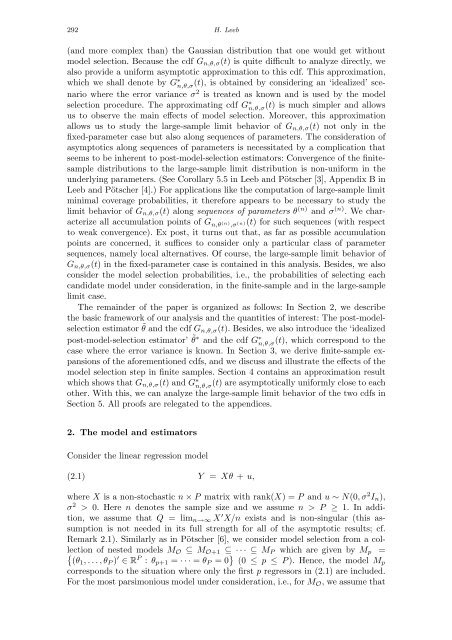Optimality
Optimality
Optimality
Create successful ePaper yourself
Turn your PDF publications into a flip-book with our unique Google optimized e-Paper software.
292 H. Leeb<br />
(and more complex than) the Gaussian distribution that one would get without<br />
model selection. Because the cdf Gn,θ,σ(t) is quite difficult to analyze directly, we<br />
also provide a uniform asymptotic approximation to this cdf. This approximation,<br />
which we shall denote by G∗ n,θ,σ (t), is obtained by considering an ‘idealized’ scenario<br />
where the error variance σ2 is treated as known and is used by the model<br />
selection procedure. The approximating cdf G∗ n,θ,σ (t) is much simpler and allows<br />
us to observe the main effects of model selection. Moreover, this approximation<br />
allows us to study the large-sample limit behavior of Gn,θ,σ(t) not only in the<br />
fixed-parameter case but also along sequences of parameters. The consideration of<br />
asymptotics along sequences of parameters is necessitated by a complication that<br />
seems to be inherent to post-model-selection estimators: Convergence of the finitesample<br />
distributions to the large-sample limit distribution is non-uniform in the<br />
underlying parameters. (See Corollary 5.5 in Leeb and Pötscher [3], Appendix B in<br />
Leeb and Pötscher [4].) For applications like the computation of large-sample limit<br />
minimal coverage probabilities, it therefore appears to be necessary to study the<br />
limit behavior of Gn,θ,σ(t) along sequences of parameters θ (n) and σ (n) . We characterize<br />
all accumulation points of Gn,θ (n) ,σ (n)(t) for such sequences (with respect<br />
to weak convergence). Ex post, it turns out that, as far as possible accumulation<br />
points are concerned, it suffices to consider only a particular class of parameter<br />
sequences, namely local alternatives. Of course, the large-sample limit behavior of<br />
Gn,θ,σ(t) in the fixed-parameter case is contained in this analysis. Besides, we also<br />
consider the model selection probabilities, i.e., the probabilities of selecting each<br />
candidate model under consideration, in the finite-sample and in the large-sample<br />
limit case.<br />
The remainder of the paper is organized as follows: In Section 2, we describe<br />
the basic framework of our analysis and the quantities of interest: The post-modelselection<br />
estimator ˜ θ and the cdf Gn,θ,σ(t). Besides, we also introduce the ‘idealized<br />
post-model-selection estimator’ ˜ θ∗ and the cdf G∗ n,θ,σ (t), which correspond to the<br />
case where the error variance is known. In Section 3, we derive finite-sample expansions<br />
of the aforementioned cdfs, and we discuss and illustrate the effects of the<br />
model selection step in finite samples. Section 4 contains an approximation result<br />
which shows that Gn,θ,σ(t) and G∗ n,θ,σ (t) are asymptotically uniformly close to each<br />
other. With this, we can analyze the large-sample limit behavior of the two cdfs in<br />
Section 5. All proofs are relegated to the appendices.<br />
2. The model and estimators<br />
Consider the linear regression model<br />
(2.1) Y = Xθ + u,<br />
where X is a non-stochastic n×P matrix with rank(X) = P and u∼N(0, σ 2 In),<br />
σ 2 > 0. Here n denotes the sample size and we assume n > P ≥ 1. In addition,<br />
we assume that Q = limn→∞ X ′ X/n exists and is non-singular (this assumption<br />
is not needed in its full strength for all of the asymptotic results; cf.<br />
Remark 2.1). Similarly as in Pötscher [6], we consider model selection from a collection<br />
of nested models MO ⊆ MO+1 ⊆···⊆MP which are given by Mp =<br />
� (θ1, . . . , θP) ′ ∈ R P : θp+1 =··· = θP = 0 � (0 ≤ p ≤ P). Hence, the model Mp<br />
corresponds to the situation where only the first p regressors in (2.1) are included.<br />
For the most parsimonious model under consideration, i.e., for MO, we assume that
















